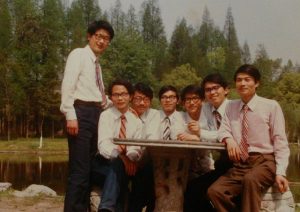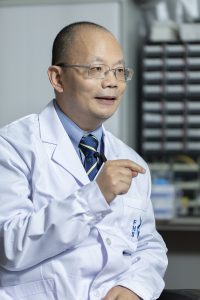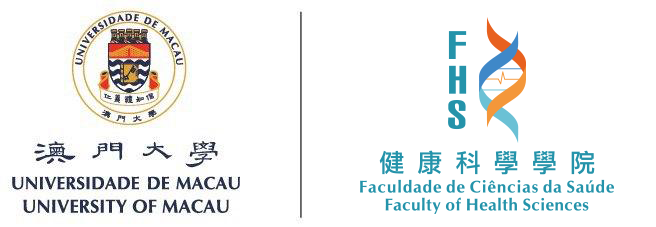Prof. Hanming SHEN in the Faculty of Health Sciences is a dedicated researcher who is also passionate about photography. He says: ‘Love of photography is in my DNA. When I press the shutter button to capture beauty on my camera, it brings me such joy!’
Spending His First Salary on a Camera
In 1980, Prof. Shen was admitted to Zhejiang Medical University (now Zhejiang University School of Medicine), where he obtained his bachelor’s and master’s degrees. But later he decided not to pursue a career in medicine. Instead, he stayed at the university to continue with his research and teaching.
Prof. Shen grew up in a rural area in Zhejiang province. At that time, everyone was poor and had little chance to see a camera, let alone learn how to use one. But when Prof. Shen received his first salary after completing his postgraduate programme, he immediately bought himself a coveted Phoenix camera. ‘No one taught me any photography skills back then. I just kept exploring, driven by my love of photography,’ he says. He gradually taught himself how to take good pictures. Over the years, he has bought different kinds of cameras, and photography has become his main hobby and an integral part of his life.
Giving Up a Career in Medicine for Scientific Research
In the early 1990s, Shen decided to study abroad for a PhD degree. With the establishment of diplomatic relations between China and Singapore in 1990, Singapore began to recruit postgraduate students from China, so he went to the Lion City in 1992 for PhD studies. Before joining UM at the beginning of this year, Prof. Shen was a tenured professor in the Department of Physiology, Yong Loo Lin School of Medicine, National University of Singapore, focusing on the study of autophagy, mitophagy, and cancer cell biology.
Prof. Shen says autophagy is an important mechanism that remains conserved in the process of biological evolution in which cells use lysosomes to remove the damaged proteins and organelles to keep the normal functions of the cell. According to Prof. Shen, autophagy has very important physiological functions, and is closely linked to many illnesses, such as cancer and neurodegenerative diseases.
In the early days of autophagy research, scientists believed that autophagy would lead to autophagic cell death. But Prof. Shen proposed the opposite, arguing that his study proved that autophagy is an important mechanism by which cells promote their own survival under starvation or other stress conditions. This study remains one of Prof. Shen’s representative findings. So far, he has published more than 200 papers in SCI-indexed journals such as Autophagy, Cell Res, Cancer Res, and Nature Protocol.
Constant Experimentation
Because of his work, Prof. Shen often travels around the world to attend conferences and exchange ideas with other experts in the field. Whenever group or event photos need to be taken, Prof. Shen often volunteers to be the photographer. For this reason, he is known among his peers as the ‘unofficial photographer’. An easy-going person by nature, Prof Shen believes that photography can bring people closer. According to Prof. Shen, photography encompasses different kinds of knowledge and skills, such as how to create aesthetically appealing pictures, how to frame the shots, how to adjust the aperture, and how to set the shutter speed. He thinks photography, like research, requires constant experimentation and learning from failure.
Prof. Shen buries himself in research all day, and has encountered his share of challenges at work. His way of decompressing is to roam the streets and take pictures of ordinary people’s lives. Recently, because of the pandemic, he hasn’t been able to return to Singapore to retrieve his cameras and other photographic equipment, so he developed a liking for taking pictures with his phone. On weekends, he often visits various places in Macao or goes hiking with other UM professors, and afterwards he likes to post pictures of the outings on WeChat Moments. He has taken some stunning pictures of clouds and sunsets on the UM campus, which have received many likes from his friends. Some of these pictures have even been shared on UM’s official WeChat account. He says: ‘Some of my friends outside Macao have told me that my pictures could easily be mistaken for promotional pictures of UM because they are so beautiful that they make people want to study and work at UM.’
28–A Number with a Special Significance
Prof. Shen left his hometown at the age of 28 and returned to China to work in Macao after spending 28 years working in Singapore. So the number 28 carries a special significance for him.
‘I spent the best 28 years of my life in Singapore, and I felt it was time to return and make a contribution to my mother country, so I decided to join UM,’ he says. Prof. Shen decided to join UM mainly because he saw the enormous potential of the Guangdong-Hong Kong-Macao Greater Bay Area. His long-term goal is to build a strong research programme and to promote autophagy research at UM, and one important strategy is to develop close collaboration with experts in the Greater Bay Area.
Source: My UM ISSUE 96


A picture of sunset at UM taken by Prof. Shen Hanming

Prof. Hanming SHEN (2nd from left) with his classmates during his university years

A photo taken by Prof. Hanming SHEN during his trip in Africa last year

Prof. Hanming SHEN loves research and photography

